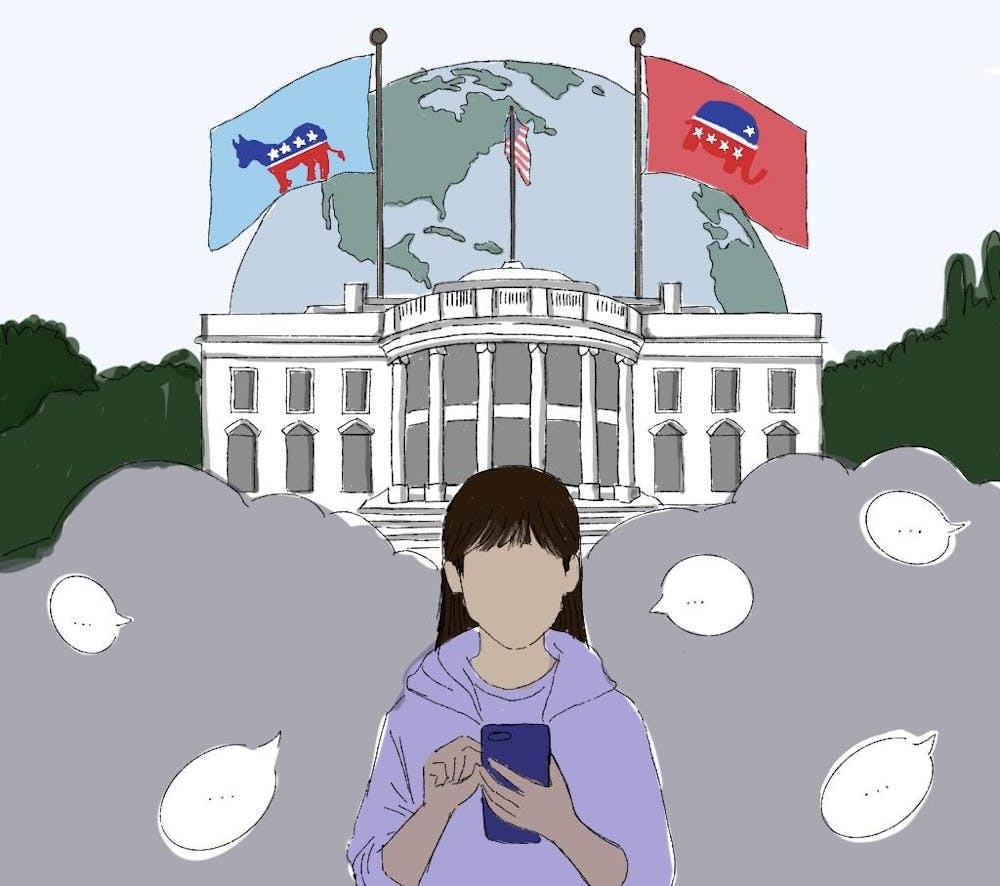Last month, international student Kate Choi ’26 tuned into the American presidential debate. While she had a fun time watching it with her friends, she also couldn’t ignore her concern over how candidates discussed issues that directly affected her experiences both back home and in the United States — immigration laws, foreign policy and climate change.
“So much depends on this election for the world in a way it shouldn’t — but it still does,” said one of Choi's friends, an international student from Europe who was granted anonymity.
In The Herald’s September first-year poll, nearly half of international respondents expressed no opinion, while 30% “somewhat disagreed” with the statement that “the US is generally heading in the right direction.” Forty-two percent of domestic students “somewhat disagreed,” nearly 30% had no opinion and 15% disagreed strongly.
For Yeabfikir Ayele (Yeab) ’25, an international student from Ethiopia, one of the main concerns surrounding this election is immigration laws.
“I think the results of the election will matter in terms of how strict (they are) with the ways people gain citizenship, or even how strict it is to come here to study with F1 visas,” she said. Yeab would like to stay in the US to pursue a PhD and gain work experience before returning to her home country.
Yeab also noted that while candidates' policies matter most to her, it is hard to ignore their rhetoric at times. “It's difficult to be branded, for example, as an alien. But that's just the term that even the IRS uses, right?” she said.
Choi expressed similar concerns, citing former President Donald Trump’s short-lived directive during the pandemic to revoke student visas for international students on a fully-online course load.
The number one concern for a lot of international students is whether or not they can stay in the US and if they can get a job, Choi, who calls both South Korea and Canada home, explained.
The international student from Europe also discussed the importance she places on abortion rights “as a young woman living in this country, even temporarily.” She emphasized that abortion policies could affect any person on a college campus.
Over 50% of first-year international respondents said they supported restoring federal protections for abortion as given under Roe v. Wade, while nearly 80% of domestic students expressed support for abortion rights.
The European international student also identified climate policy as a key issue with global impacts. She expressed concern for the future of the Paris Agreement, from which Trump withdrew during his term, and Harris’s stance on fracking.
Climate change “has a direct implication on us, just as human beings,” Yeab said.
Yeab also believes the election results will have implications for the geopolitical climate of her home country. She described the instability in Ethiopia due to mounting tensions with Somalia and Egypt, pointing out that American politics will always play a role because of its “perpetual history of being involved in domestic policies in other countries,” she said.
The international student from Europe said that she is paying attention to the possibility of a ceasefire in Gaza, which she believes is at stake in this election.
All three emphasized the importance of staying informed in American politics as an international student. “I think it’s a lot about engaging people in discourse and reminding people what a privilege it is to be in a country where you have the right to vote and partake in decision-making,” she said.
Yeab stressed the importance of political engagement regardless of citizenship.
“When people tell you you can’t vote … that doesn’t necessarily mean you don’t need to be educated about what’s going on. And I think there’s a lot of power that comes in having that education,” Yeab said.
Elena Jiang is a University News Editor from Shanghai, China concentrating in English Nonfiction and International & Public Affairs.





